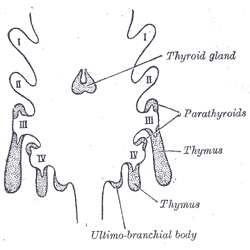Thymus
(Redirected from Thymus gland)
Thymus is a specialized primary lymphoid organ of the immune system. Within the thymus, T cells or T lymphocytes mature. T cells are critical to the adaptive immune system, where the body adapts specifically to foreign invaders. The thymus is located in the upper front part of the chest, just behind the sternum and between the lungs. The organ is divided into two lobes, which are further subdivided into numerous small lobules. The thymus plays a vital role in the development of the immune system, particularly in early life.
Structure and Function
The thymus is made up of two types of tissue, known as the cortex and medulla, which serve different functions in the development of T cells. The cortex is densely packed with immature T cells, while the medulla provides a site where these cells mature. Once mature, T cells migrate to the lymph nodes and other peripheral tissues where they perform their immune functions.
The process of T cell maturation involves several critical steps, including the selection processes known as positive and negative selection. These processes ensure that the T cells are capable of recognizing foreign molecules (positive selection) but are not reactive to the body's own tissues (negative selection).
Developmental and Functional Decline
The thymus is most active during the neonatal and pre-adolescent periods. After puberty, the thymus starts to slowly shrink and become replaced by fatty tissue, in a process known as thymic involution. Despite this involution, the thymus continues to produce T cells, albeit at a reduced rate, throughout adult life.
Clinical Significance
The thymus is involved in several clinical conditions. Thymic hyperplasia, for example, can cause an increase in the size of the thymus, which may be associated with diseases such as Myasthenia Gravis, a condition characterized by muscle weakness. Thymomas, tumors of the thymus gland, can also occur, though they are relatively rare.
Thymic Education of T Cells
The education of T cells in the thymus is crucial for the development of a functional and self-tolerant T cell repertoire. This process involves the interaction of T cells with thymic epithelial cells, which present antigens to the developing T cells. This interaction ensures that T cells with receptors capable of recognizing self-antigens are eliminated, preventing autoimmune diseases.
Conclusion
The thymus plays a crucial role in the development and maintenance of the body's immune system. Despite its size reduction with age, its function in T cell maturation and selection remains vital for immune competence throughout life.
Transform your life with W8MD's budget GLP-1 injections from $125.
W8MD offers a medical weight loss program to lose weight in Philadelphia. Our physician-supervised medical weight loss provides:
- Most insurances accepted or discounted self-pay rates. We will obtain insurance prior authorizations if needed.
- Generic GLP1 weight loss injections from $125 for the starting dose.
- Also offer prescription weight loss medications including Phentermine, Qsymia, Diethylpropion, Contrave etc.
NYC weight loss doctor appointments
Start your NYC weight loss journey today at our NYC medical weight loss and Philadelphia medical weight loss clinics.
- Call 718-946-5500 to lose weight in NYC or for medical weight loss in Philadelphia 215-676-2334.
- Tags:NYC medical weight loss, Philadelphia lose weight Zepbound NYC, Budget GLP1 weight loss injections, Wegovy Philadelphia, Wegovy NYC, Philadelphia medical weight loss, Brookly weight loss and Wegovy NYC
|
WikiMD's Wellness Encyclopedia |
| Let Food Be Thy Medicine Medicine Thy Food - Hippocrates |
Medical Disclaimer: WikiMD is not a substitute for professional medical advice. The information on WikiMD is provided as an information resource only, may be incorrect, outdated or misleading, and is not to be used or relied on for any diagnostic or treatment purposes. Please consult your health care provider before making any healthcare decisions or for guidance about a specific medical condition. WikiMD expressly disclaims responsibility, and shall have no liability, for any damages, loss, injury, or liability whatsoever suffered as a result of your reliance on the information contained in this site. By visiting this site you agree to the foregoing terms and conditions, which may from time to time be changed or supplemented by WikiMD. If you do not agree to the foregoing terms and conditions, you should not enter or use this site. See full disclaimer.
Credits:Most images are courtesy of Wikimedia commons, and templates, categories Wikipedia, licensed under CC BY SA or similar.
Translate this page: - East Asian
中文,
日本,
한국어,
South Asian
हिन्दी,
தமிழ்,
తెలుగు,
Urdu,
ಕನ್ನಡ,
Southeast Asian
Indonesian,
Vietnamese,
Thai,
မြန်မာဘာသာ,
বাংলা
European
español,
Deutsch,
français,
Greek,
português do Brasil,
polski,
română,
русский,
Nederlands,
norsk,
svenska,
suomi,
Italian
Middle Eastern & African
عربى,
Turkish,
Persian,
Hebrew,
Afrikaans,
isiZulu,
Kiswahili,
Other
Bulgarian,
Hungarian,
Czech,
Swedish,
മലയാളം,
मराठी,
ਪੰਜਾਬੀ,
ગુજરાતી,
Portuguese,
Ukrainian
Contributors: Prab R. Tumpati, MD






